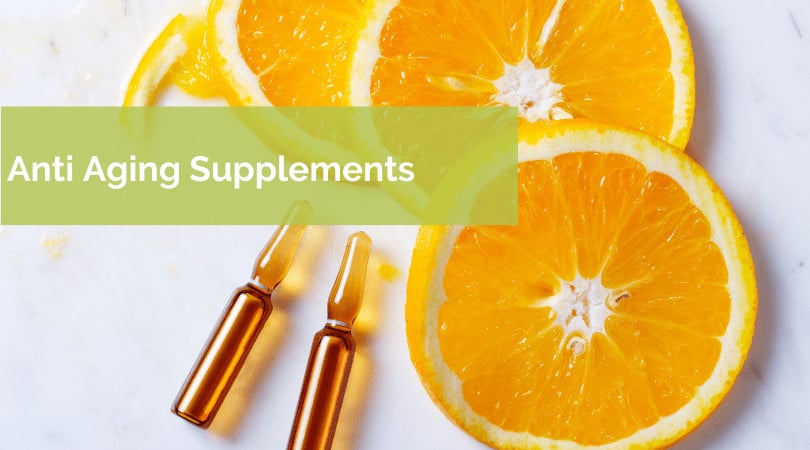
We all have an innate fear of growing old and want to “live forever”. It can be in shock when we discover that there aren’t as many years left in our lives as we’d hoped.
It might not be so much the advancing years (afterall that comes with increased wisdom), but the physical effects of aging can be difficult to handle. Many times sooner than we’d like, we grow weaker, develop health problems, and find ourselves with reduced energy levels. These physical effects can make it harder to live our lives to the fullest.
Thankfully, nature has a way to keep us feeling young and healthy for many more years to come! While a healthy diet, regular exercise, stress management, and good sleep are all foundations to help you feel your best. But, anti-aging nutritional supplements can play a role in keeping you healthy as well.
There are many important anti-aging supplements, made from natural ingredients and designed to help counteract some of the the effects of aging. While they won’t stop you from growing older, they can slow the loss of bone, muscle tissue, connective tissue, brain cells, neurons, and organ cells. Essentially, they’ll reduce the detrimental effects of aging in a natural way.
Taking supplements and vitamins should never be viewed as a substitute for eating a healthy diet. However, for many of us it is very difficult to get sufficient amounts of key nutrients from diet alone.
While we live in a time where there is more abundant and affordable food than at any time in history, the quality of our food has decreased both due to food choices and to the depletion of nutrients in our soils over the past 100 years.
There are numerous studies such as the Kushi Institute analysis of nutrient data from 1975 to 1997 that found average calcium levels in a dozen different fresh vegetables dropped an average of 27 percent (e.g. iron levels down 37 percent; vitamin A levels down 21 percent, and vitamin C levels down 30 percent).
A recent National Health and Nutrition Examination Survey, found the foods that contribute the most calories in the American diet are, in descending order; grain based desserts, breads, chicken, soda, pizza, and alcohol.
This represents a huge change in food choices when compared to 50 years ago, which may possibly explain the health problems many of us are facing as we age. We eat a LOT more processed foods that contain high amounts of sugar and polyunsaturated fats that accelerate oxidation in our cells.
If you combine this poor food environment with a high level of stress and little physical activity, it can rapidly accelerate the aging process. If we don’t provide our bodies with the right nutrients, it will lead us down a path to faster aging and greater health concerns.
You may have noticed people who are 60, but look like they are 80, and people who are 60 who look 20 years younger. Some of this difference can be due to heredity, but many times this can be due to a lack of key nutrients.
You can significantly slow the aging process by reducing the amount of oxidation and inflammation in your body by taking the right supplements. One thing to note, supplements should always be tailored to the individual, so speak to your doctor about what’s best for you.
Here are The Best Anti-aging Supplements:
Vitamin C
If there is one supplement that is all but guaranteed to slow down the effects of growing older, it’s vitamin C!
Vitamin C is the primary nutrient needed by your body to help produce collagen and elastin, the two proteins that keep your skin tight, fresh, and healthy. Without enough Vitamin C, your skin begins to lose its freshness and elasticity, which can result in wrinkles, sagging skin, and age spots.
Not only does your body use vitamin C to help keep skin looking youthful, vitamin C also protects skin from damage by free radicals and the sun. It has antioxidant properties that help the body fight off oxidative stress, one of the main causes of aging.
It’s not too hard to get enough vitamin C in your diet, it is found in nearly all fruits and vegetables. But adding a Vitamin C supplement for anti-aging to your day can provide extra vitamin C to support collagen and elastin production.
The benefits don’t stop there! Vitamin C is also needed for fat-burning and it plays a major role in your body’s immunity to disease. Get more Vitamin C, and you’ll be much healthier for years to come.
PLE
Polypodium Leucotomos Extract, or PLE, is an extract from an herb known as the Calaguala, or the Fernblock. What makes this supplement so unique is its ability to protect your skin from UVB radiation.
The sun’s UV rays can damage your skin, increasing oxidative stress and leading to genetic mutations that may eventually turn into melanoma (skin cancer). However, the UV rays also breakdown collagen and elastin, causing your skin to wrinkle and sag.
PLE can protect your skin from the UV rays damage, thereby preventing the breakdown of your skin and keeping it healthy.
Unlike other anti-aging skin supplements, PLE can be ingested orally instead of applied topically. This makes it a useful addition to your daily vitamin and mineral regimen, and it may be just what you need to keep your skin healthy.
CoQ10
CoQ10 is the name for Co-enzyme Q10, a substance that is required by the human body in order to produce the ATP energy that fuels our muscles. When we are young, our bodies produce a lot of this enzyme, but CoQ10 production decreases as we age.
This can lead to not only reduced muscle energy, but also a decrease in muscle mass and even cellular dysfunction, which may put us at greater risk of developing age-related health conditions. A lack of CoQ10 has been linked to heart disease, cancer, diabetes, and Parkinson’s disease.
The primary benefit of CoQ10 is improved heart health, making this one of the best supplements to reduce your risk of cardiovascular disorders. Considering how prevalent heart disease is in the world today (the #1 cause of death, for that matter!), you can see why this heart-smart supplement is one of the best options for reducing your risk of aging.
CoQ10 can help reduce clotting, scavenge for free radicals, and protect your cells from oxidative damage. It can even help to manage your blood sugar levels, get your blood pressure under control, and lower cholesterol. Definitely a supplement worth considering if you want a healthier heart!
Vitamin E
Vitamin E is definitely in competition with vitamins A and C as the “best vitamins of all”! It is one of the best anti-aging antioxidant supplements out there and a must have for helping mitigate the effects of advancing age.
The primary task of vitamin E is to protect your skin from damage caused by free radicals. When you apply topical Vitamin E, you are infusing your skin with a layer of oil that traps moisture in and helps keep damaging compounds out. This will not only prevent your skin from becoming too dry (which can lead to skin damage), but it also helps to keep your skin oil (sebum) balanced.
But with vitamin E, you are also taking a heart-smart supplement. Vitamin E actually acts as a coating for your arteries, preventing cholesterol from sticking the walls of your blood vessels. This not only stops a build-up of cholesterol, but it also stops the cholesterol from hardening and turning into plaque. The result is a much lower risk of heart disease, specifically heart attacks and strokes resulting from blood clots caused by cracks in your arterial walls.
Vitamin E can and should be taken both orally and topically. Apply it to your skin to protect yourself from excessive sunlight, pollution, and radiation, and consume it to protect your cardiovascular system.
Omega-3 Fish Oil
Fish oil is a supplement that will do your body A LOT more good than you realize!
Fish oil (salmon, cod, etc.) contains more omega-3 fatty acids than any other food on the planet. Omega-3 fatty acids help to reduce inflammation, particularly the low-grade inflammation that is a marker of chronic disease. By preventing inflammation, you can reduce your risk of cancer, diabetes, heart disease, and the list goes on.
Omega-3 fatty acids are also amazing for your joints. They can reduce the swelling caused by damage done through exercise or daily use, and they can even help to increase joint mobility. For those worried about arthritis, omega-3 fatty acids are the supplement to take.
But the benefits don’t stop there! Omega-3 fatty acids are also very good for your brain, and they can help to keep your brain cells working and your neurons firing properly. They also play a role in neuroplasticity, ensuring that your brain cells are flexible and able to adapt to your daily demands.
Choosing the Best Anti-Aging Supplements
While these are some of the best anti-aging nutritional supplements for you to consider, it is always best to speak to your doctor about which supplement is safest and best for you.
And don’t forget the benefits of food! Many of these, like vitamins E, C, and omega-3s, can be found in food as well.
If you do add these to your routine, you may find that they can do you a world of good.
References;
- Dirt Poor: Have Fruits and Vegetables Become Less Nutritious? Scientific American. Published online April 27, 2011. Accessed September 7, 2021. https://www.scientificamerican.com/article/soil-depletion-and-nutrition-loss/
- Huth PJ, Fulgoni VL, Keast DR, Park K, Auestad N. Major food sources of calories, added sugars, and saturated fat and their contribution to essential nutrient intakes in the U.S. diet: data from the National Health and Nutrition Examination Survey (2003-2006). Nutr J. 2013;12:116.
- Vitamin C. Accessed September 7, 2021. https://ods.od.nih.gov/factsheets/VitaminC-HealthProfessional/
- Padayatty SJ, Katz A, Wang Y, et al. Vitamin C as an antioxidant: evaluation of its role in disease prevention. J Am Coll Nutr. 2003;22(1):18-35.
- Nestor MS, Berman B, Swenson N. Safety and Efficacy of Oral Polypodium leucotomos Extract in Healthy Adult Subjects. J Clin Aesthet Dermatol. 2015;8(2):19-23.
- Hernández-Camacho JD, Bernier M, López-Lluch G, Navas P. Coenzyme Q10 Supplementation in Aging and Disease. Front Physiol. 2018;9:44.
- Kumar A, Kaur H, Devi P, Mohan V. Role of coenzyme Q10 (CoQ10) in cardiac disease, hypertension and Meniere-like syndrome. Pharmacol Ther. 2009;124(3):259-268.
- Mori TA, Beilin LJ. Omega-3 fatty acids and inflammation. Curr Atheroscler Rep. 2004;6(6):461-467
- Persistent Tiredness and Chronic Fatigue: Causes and Symptoms - February 27, 2024
- Can A Protein Shake Replace A Breakfast Meal? - March 2, 2023
- Glutamine After Surgery: Does It Help With Recovery? - February 17, 2023

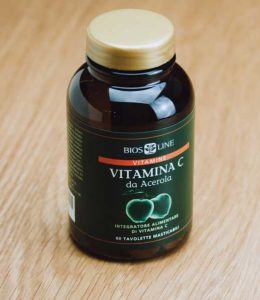
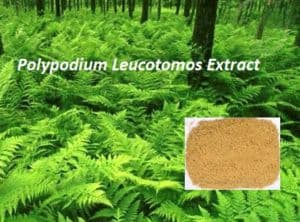
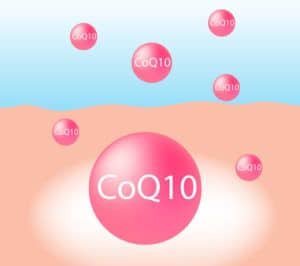
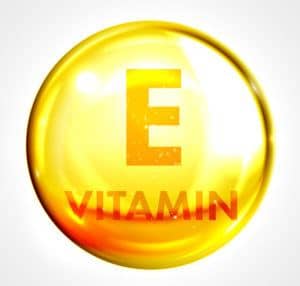





I am very interesting in anti aging supplements. It just hit me a few weeks ago that I am going to age one day. I don’t want to! I am paranoid that I’m going to start getting wrinkles and I am much too young for that. I didn’t know that Vitamin E was good for you skin so I am going to get some and start protecting my skin more!
These are all very good ingredients, to take orally as well as to use topically.